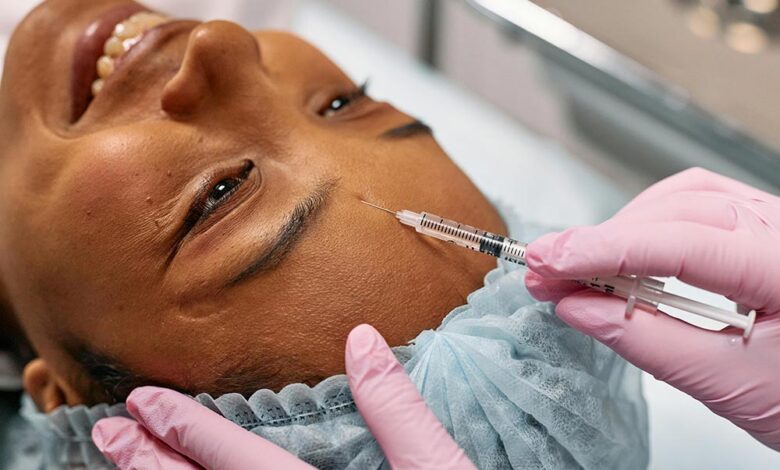Power of Exosomes in Women’s Beauty, Health Care

By Hermoine Macura-Noble
Special to The Times Kuwait
Exosomes, the tiny extracellular vesicles derived from stem cells and other cells, are emerging as a revolutionary tool for various conditions in the fields of beauty and health care. With their unique properties, exosomes are being studied and applied in various ways that promise to transform women’s health care, with some experts also conducting studies to see their effectiveness in treating diseases such as cancer.
“Unlike other treatments, exosomes have a dual effect as it acts as a regenerative molecule and anti-inflammatory at the same time. Before exosomes, doctors needed to use multiple products to get the effect of regeneration of the cells and to reduce inflammation…

Today, exosomes can treat many conditions from acne scars to hair thinning as well as complex gynecology conditions such as lichen sclerosus and menopause,” explains Dr. Maria Karakoulaki, a leading aesthetic and functional gynaecologist and menopause expert in the Gulf.
Exosomes are small particles, about 30-150 nanometers in diameter, released by nearly every cell type in the body. They play a crucial role in cell-to-cell communication by transferring proteins, lipids, and genetic material from one cell to another.
Researchers have recently discovered that exosomes from stem cells, especially mesenchymal stem cells (MSCs), can be harnessed for therapeutic purposes. These exosomes carry regenerative properties without the ethical and technical complexities of using whole stem cells, making them a more attractive option for beauty and medical applications.
One of the most exciting uses of exosomes is in the skincare industry. As women age, the skin’s ability to repair itself diminishes, leading to wrinkles, loss of elasticity, and a dull complexion. Exosomes, especially those derived from stem cells, have been found to stimulate the production of collagen and elastin, the proteins responsible for keeping the skin firm and youthful.
Exosomes can improve skin texture, reduce fine lines, and promote a more radiant complexion by stimulating collagen production, reducing inflammation, improving hydration, and giving the skin a healthy, plump appearance.
Many skincare brands and clinics now offer exosome-based treatments, such as serums and facials, that promise to enhance the skin’s regenerative capabilities. Clinical results have shown that exosome therapies can accelerate healing, reduce scarring, and provide a more youthful, glowing appearance, making them a powerful tool in the anti-aging arena.
“I believe that we are still in the beginning of the ‘Exosome Era’ as it will be involved in many medical and therapeutic treatments, such as cancers. There are current studies on it. In addition, it will be used as a drug delivery system since it acts as a carrier between cells,” adds Dr Karakoulaki.
Beyond beauty, exosomes are potent in broader healthcare applications. Their regenerative properties make them suitable for healing and repairing tissues, which has significant implications for women’s health, particularly in conditions like pelvic floor disorders and reproductive health.
Pelvic floor disorders, such as pelvic organ prolapse and incontinence, affect many women, particularly after childbirth or during menopause. Exosome therapies are being explored as a non-surgical option for treating these conditions by promoting tissue repair and reducing inflammation.
“The most obvious result is the treatment of lichen sclerosus. This condition causes thinning of the skin and severe discomfort to patients. It’s a chronic inflammation without a clear root cause. The exosomes attack, heal the inflammation and regenerate the skin simultaneously.
As a result, the patient gains healthy skin and stops suffering from the exhausting itching and pain that Lichen sclerosus is causing. Although there is no definitive healing in the case of lichen sclerosus, the flare-ups happen less frequently and with less intensity, which is a big improvement in a patient’s life quality,” shares Dr. Karakoulaki.

Exosomes are being studied in reproductive medicine for their role in ovarian function and fertility. Studies suggest that exosomes from specific stem cell sources can help regenerate ovarian tissue, potentially offering new treatments for women with premature ovarian failure or other fertility issues. Furthermore, exosomes are involved in the communication between the embryo and the maternal environment, making them a research focus in improving IVF success rates.
Exosome-based therapies are also being investigated for their potential to modulate the immune system, reduce inflammation, and promote tissue repair in conditions such as endometriosis, polycystic ovary syndrome (PCOS), and uterine fibroids.
Endometriosis, a painful condition where tissue similar to the lining of the uterus grows outside the uterus, is characterized by chronic inflammation. Exosomes, with their anti-inflammatory properties, may offer a new treatment pathway. By delivering targeted anti-inflammatory signals to affected areas, exosomes can reduce pain and limit the spread of endometrial tissue.
Polycystic ovary syndrome (PCOS) is a hormonal disorder that affects many women. Exosomes are being studied for their potential to improve insulin sensitivity and restore hormonal balance, which could offer relief from some of the symptoms of PCOS, including irregular periods and fertility challenges.
Exosomes may also play a role in regenerative gynecological surgeries. In procedures such as uterine repair or vaginal rejuvenation, exosomes can be used to enhance healing and reduce scarring. They promote faster recovery times and improve overall surgical outcomes.
While exosome therapies are still relatively new, early results are promising, and ongoing studies will help refine their use and improve their effectiveness. From reducing wrinkles and boosting collagen production to offering potential treatments for pelvic floor disorders and reproductive health, exosomes can revolutionize how women care for their bodies. As research advances, the therapeutic applications of exosomes will continue to grow, offering new hope for women seeking innovative, non-invasive treatments for various health concerns.
 By Hermoine Macura-Noble
By Hermoine Macura-Noble
The first Australian English speaking News Anchor in the Middle East. She is also the Author of Faces of the Middle East and Founder of US-based 501c3 charity – The House of Rest which helps to ease the suffering of victims of war. For more from our Contributing Editor, you can follow her on Instagram, here.











